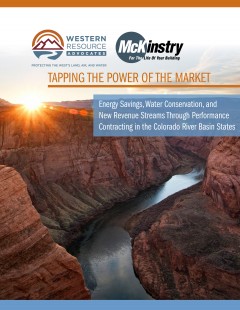
by Brianna Crandall — August 31, 2015—Conservation group Western Resource Advocates and design-build-operate-and-maintain (DBOM) firm McKinstry recently released a market study indicating that schools and governments in Colorado River Basin states (Arizona, California, Colorado, New Mexico, Nevada, Utah, and Wyoming) can save $859 million annually by using performance contracting to clear the financial hurdles to implementing effective energy and water conservation measures.
Performance contracting is a mechanism that allows public entities, such as a school district or local government, to quickly perform comprehensive energy and water retrofit projects in public buildings using a qualified private energy services company, explains WRA.
The savings on water or electric bills resulting from the installation of energy and water conservation measures are guaranteed by an energy services company to exceed the financing costs necessary to implement the energy and water-saving upgrades. If the realized savings do not exceed the financing costs, the contracted energy services company makes up the difference.
At a time when Western states are looking at all options to save energy, reduce carbon pollution, and conserve water, the report, Tapping the Power of the Market: Energy Savings, Water Conservation, and New Revenue Streams Through Performance Contracting in the Colorado River Basin States, presents new research findings indicating performance contracting is a financially powerful tool to achieve these goals.
The report shows how government and school facilities would save more than 6 million megawatts of electricity, 4 million cubic feet of natural gas, and 40,000 acre feet of water a year by implementing conservation measures using the performance contracting approach. Those energy savings could power all of Denver’s homes for a year, and the water savings could supply more than 150,000 homes per year, calculates WRA.
Alhough it is unfamiliar to many people, the performance contracting model is a smart approach for cities, counties, school districts, and wastewater/water utilities to implement energy and water efficiency improvements in their facilities, the report concludes.
Innovative governments, schools and other public entities have used the financing mechanism for more than two decades to install advanced water metering technologies that pay for themselves, thereby saving energy and promoting renewable sources of energy.
Report authors noted that stretching limited water supplies is more important than ever with the over-allocation of the Colorado River Basin as well as extended droughts and growing populations in many Western states.
The report found that water utilities in Colorado River Basin states could use performance contracting for water meter replacement projects that introduce advanced technologies to not only reduce apparent water loss (resulting from customer meter inaccuracies) by 461,000 acre-feet per year, but to also provide $593 million in additional revenue per year.
For Tapping the Power of the Market, McKinstry and Western Resource Advocates evaluated the amount of water savings, energy savings, and revenue that public entities can realize using performance contracting in the Colorado River Basin states by quantifying: 1) electricity, natural gas, and water savings in public facilities 2) revenue and water savings achievable in municipal water service areas through water meter replacements, and 3) electricity savings achievable in municipal water supply and waste water treatment systems.
For the Executive Summary and full report, visit the Tapping the Power of the Market page on the WRA Web site.




